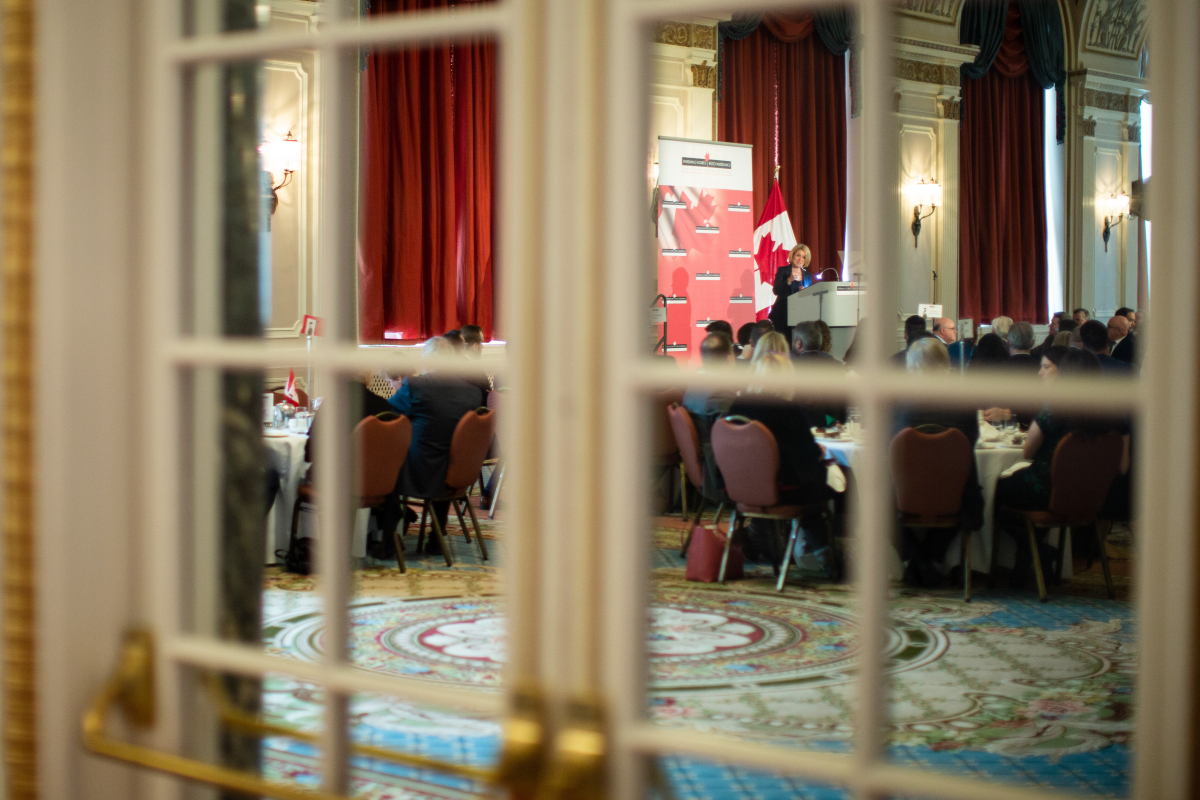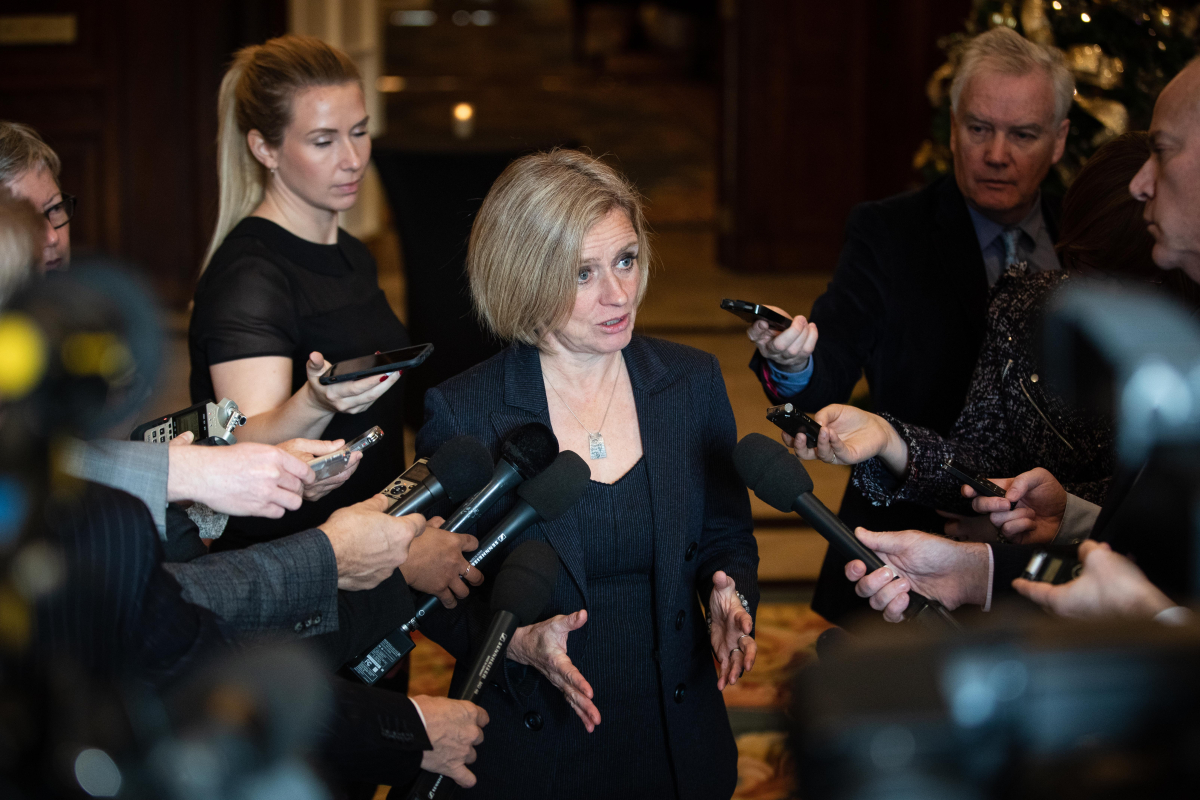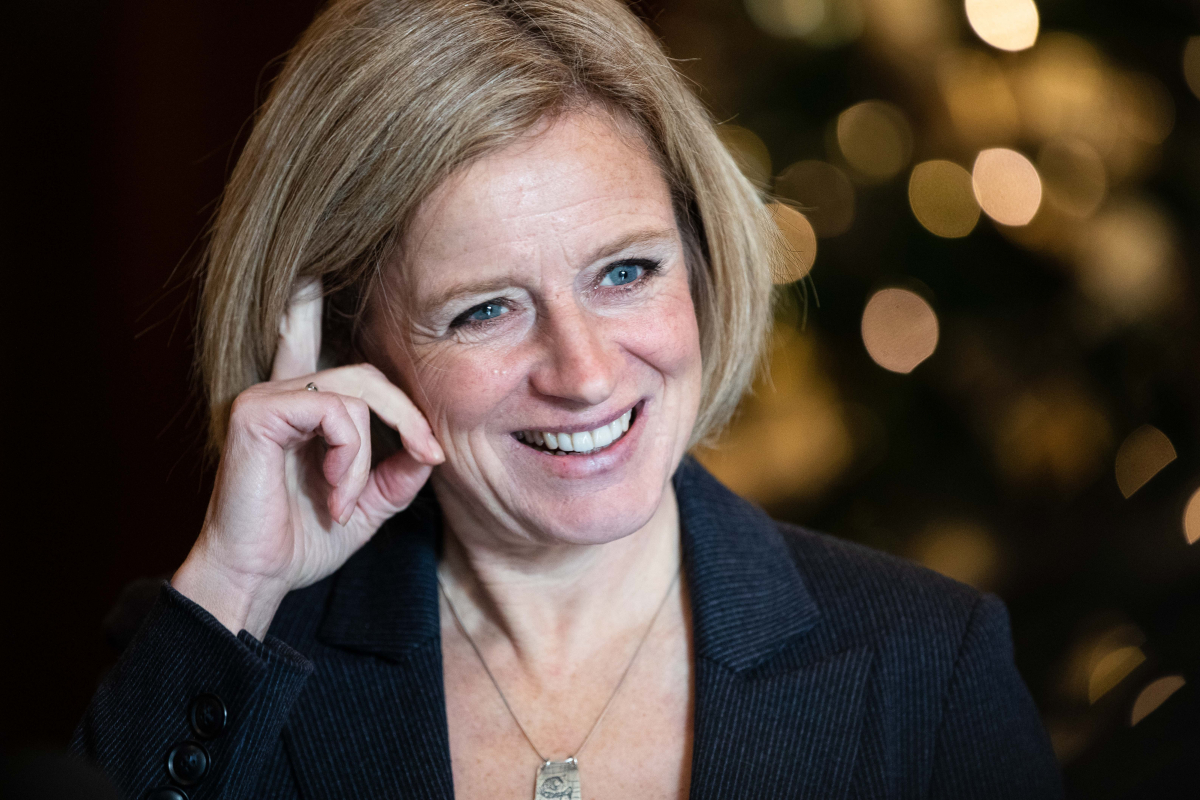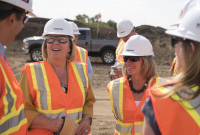Support strong Canadian climate journalism for 2025
Alberta Premier Rachel Notley wants more taxpayer dollars to fund a plan to boost the transport of oil-by-rail.
The premier from the oil-rich province made the comments on Wednesday, while speaking to a lunchtime business crowd at a five-star hotel in Ottawa. At the event, hosted by the Canadian Club, Notley said that she has asked Prime Minister Justin Trudeau to commit to co-purchasing two new unit-trains to transport an additional 120,000 barrels of Alberta oil a day.
“To be clear: that would increase the already record levels of crude by rail by another third,” she said in a prepared speech.
The Trudeau government has already spent $4.5 billion on what some have described as an oilpatch bailout plan to purchase the Trans Mountain oil pipeline and related assets from Texas energy company Kinder Morgan, in order to proceed with construction of the Trans Mountain pipeline expansion project to the west coast of British Columbia.
This decision has been welcomed by industry stakeholders who say that Ottawa should be doing a lot more to support fossil fuel expansion. Environmentalists and other critics, including federal New Democrats, say that this is the wrong approach needed to address the threat of climate change.
“Ottawa took a big step when they bought the Trans Mountain pipeline, and let me be clear, they deserve a credit for that, that was an important decision (and) we would be in much more difficult circumstances if they hadn’t done it,” Notley told reporters.
However, she added, “It’s a job well started, it’s not a job well done.”
Industry officials and some government officials say that a new pipeline would alleviate a gap in the price Canadian producers can now get for their oil, versus the price that the market pays for oil from other jurisdictions. Industry stakeholders have suggested this gap is costing the Canadian economy billions of dollars a year, although some analysts, including economist Robyn Allan, say these claims are greatly exaggerated or in some cases false, since many companies have taken steps to protect themselves from the price gap.
Allan estimates as little as 20 per cent of Alberta’s oil supply is affected by the differential, while journalist Andrew Nikiforuk recently highlighted three oil companies that have made “record profits” as a result of investing in refineries and upgraders.
In an email to National Observer, Cheryl Oates, a spokesperson for Notley, said, “What remains true no matter whether a company is itself refining and upgrading is that this resource belong(s) to Albertans and Albertans are the ones who are losing out if (Western Canadian Select heavy oil) is selling for $10 (a) barrel, even if the companies are in effect, selling it to themselves.”
Notley compared Alberta’s oil pricing differential to the automotive sector problems emerging from GM closing its plant in Oshawa.
“The federal government needs to understand that this too is a crisis and this too is an area on which they have agency,” she said.
“In no way do I want to detract from the real concern and anxiety and importance of the difficulties that are happening with GM and the need for the federal government to focus on that. Absolutely they should, but at the same time what’s going on in Alberta isn’t just about a similar number or a greater number of Alberta workers, it’s actually about the ripple effect that will happen throughout the Canadian economy that is significant.”

Notley's rail proposal
Notley said the new trains would help narrow the oil price gap by about $4 a barrel, adding at least a million dollars a day to the federal government’s coffers. The Alberta government is still in negotiations, and has been in “detailed conversations” with the Canadian Pacific Railway and the Canadian National Railway. The province did not release the number of cars or locomotives that would be included in two unit-trains.
Alberta has been pitching for more rail access for weeks, as it awaits decisions on more pipelines.
“It would provide our smaller producers with a more affordable option to move their oil to market,” she said. “And it would raise royalty revenue and, from selling rail capacity, would raise commercial revenue.”
If Ottawa doesn’t support Alberta’s effort, Notley said that the province will buy the train units on its own.
“Alberta will buy the rail cars ourselves to move this oil. And we’re not wasting any time. We have already engaged a third-party to negotiate and work is well underway,” she said.
“We anticipate conclusion of the deal within weeks. Our costs will be fully recouped through royalties and the selling of shipping capacity. It makes sense.”
Notley described rail as a short-term solution; in Calgary on the weekend, Finance Minister Bill Morneau told reporters that the federal government is not interested in “divert(ing) our resources to ideas that won’t actually have an important impact.”
Vanessa Adams, press secretary to Natural Resources Minister Amarjeet Sohi, said Wednesday the federal government is part of a working group with Alberta and Saskatchewan that is analyzing oil transport and refinery options. This analysis includes, she told National Observer in an email, “the oil by rail proposal that we have recently received from the Alberta government, to relieve the pain being felt by so many.”
Adams said the federal government is “focused on ensuring that every barrel of Alberta oil gets its full value.”

An Energy East revival?
Notley is expected to meet the prime minister and other premiers in Montreal for a first ministers’ meeting on Dec. 7.
In recent weeks, Notley’s new counterparts in New Brunswick and Ontario have indicated they would be interested in resuscitating discussions of east-bound oilsands pipelines.
New Brunswick Premier Blaine Higgs has said he would like to see provincial governments work together to resubmit the Energy East application that was abandoned in September 2017. In an economic and fiscal review released Nov. 15, Ontario Premier Doug Ford’s government said it wouldn’t stand in the way of interprovincial pipelines.
TransCanada Corp., the Calgary-based energy company that previously was proposing to build Energy East, has said it has no plans to resurrect the pipeline proposal. It is now relying on some government support from Alberta to proceed with another major pipeline project, the Keystone XL pipeline. Alberta has agreed to buy some space as a shipper on the pipeline to ensure it has enough customers to proceed.
Notley said her government would be “very interested” in a project to get Alberta oil to tidewater or to supply the rest of Canada.
“Quite frankly it is perverse that we are selling our oil in Alberta for $10 a barrel and then in Eastern Canada we are importing from places like Saudi Arabia. This makes no sense,” she said.
“I think most Canadians would agree that efforts that we can take to encourage economic development through the intelligent use of our energy resources would be welcome, so we certainly would be always happy to have those conversations and look forward to having more in the future.”
A recent study by the National Energy Board concluded that Atlantic Canada refineries still rely primarily on imported oil, including from the United States and Saudi Arabia. However, the reversal and expansion of the Line 9B pipeline has made Quebec more and more reliant on Western Canadian crude.
Editor's note: This story was updated with additional comments at 6:48 p.m. EST on Nov. 28, 2018.






Comments
The federal and provincial governments have been subsidizing the oil and gas industry for years. They don't need more money, as we don't need more oil hitting the road (railways in this case). These subsidies, estimated at $3.2 billion per year minimum, should be cancelled and redirected to put policies in place for a rapid transition of the Canadian economy from a fossil fuel based economy to a more sustainable and greener economy.
For example, that money could help replace the production of gas-guzzling vehicles in Oshawa by electric vehicles. I wouldn't mind the government using my taxes to help workers at the Oshawa plant make that transition. I'm not saying that we should subsidize GM again. We should be trying to innovate and find a Canadian solution to our problems and involve the workers in the process.
Building electric vehicles, wind power or solar panels might not solve climate change, but it might change people's mindset that they can move, get energy and heat their homes without burning fossil fuels, and that it doesn't mean that the end of the world has arrived. To succeed in this transition, we need inspirational leaders that can bring us there. Unfortunately, they are missing in action.
Going renewable is currently the only alternative to going back to the stone age.
You should watch the movie "The Age Of Stupid". Doing nothing is not an option.
Well she's in luck. The dumbasses on the government benches in Ottawa don't actually believe in catastrophic anthropogenic climate change. They may not think it's a Chinese hoax, like Trump, who actually is himself a Chinese hoax. But they don't believe in it either. I mean who in their right mind who actually believed catastrophic anthropogenic climate change was real, happening already and about to get civilization threatening worse would behave as these Liberal asshats are behaving? You want to know who would? Andrew Scheer's Conservatives, that's who. That's right, I'm saying there's now no difference other than cosmetic between Scheer's Conservatives and Trudeau's Liberals. And having said that I also have to say this. We're fucked.
"...I'm saying there's now no difference other than cosmetic between Scheer's Conservatives and Trudeau's Liberals"
=========
Who told you that?
I agree with OP. Everyone in my circles agrees. It's kind of obvious that Trudeau does old-style politics, where he gives people sops in exchange for the stability of the status quo. However, at least we get sops, but....
I'm for this IF we must continue developing our oil production. Hmmmmm, maybe Notley is just distracting us from THAT question.
But I'm still for the potential damage from a few spilled train cars than a gusher from a broken pipe.
Cheryl Oates, a spokesperson for Notley, said, “What remains true no matter whether a company is itself refining and upgrading is that this resource belong(s) to Albertans and Albertans are the ones who are losing out if (Western Canadian Select heavy oil) is selling for $10 (a) barrel, even if the companies are in effect, selling it to themselves.”
If integrated oilsands companies are making out like bandits on AB's cheap feedstock, the solution is to tax those profits and/or revise AB's royalty scheme.
As is, public coffers are suffering while oil companies suck out billions of dollars from AB while amassing huge liabilities for taxpayers.
Something wrong with that scheme, and it's called government mismanagement.
Notley's in charge. She has the power to make change. To use the Premier's own words: The provincial government needs to understand that this is a crisis and this too is an area on which they have agency.
If Notley continues to enable the oilsands industry's rapacity, she and her industry-captured minions deserve to lose the next election.
And surely oilsands companies can buy their own rail cars and locomotives!